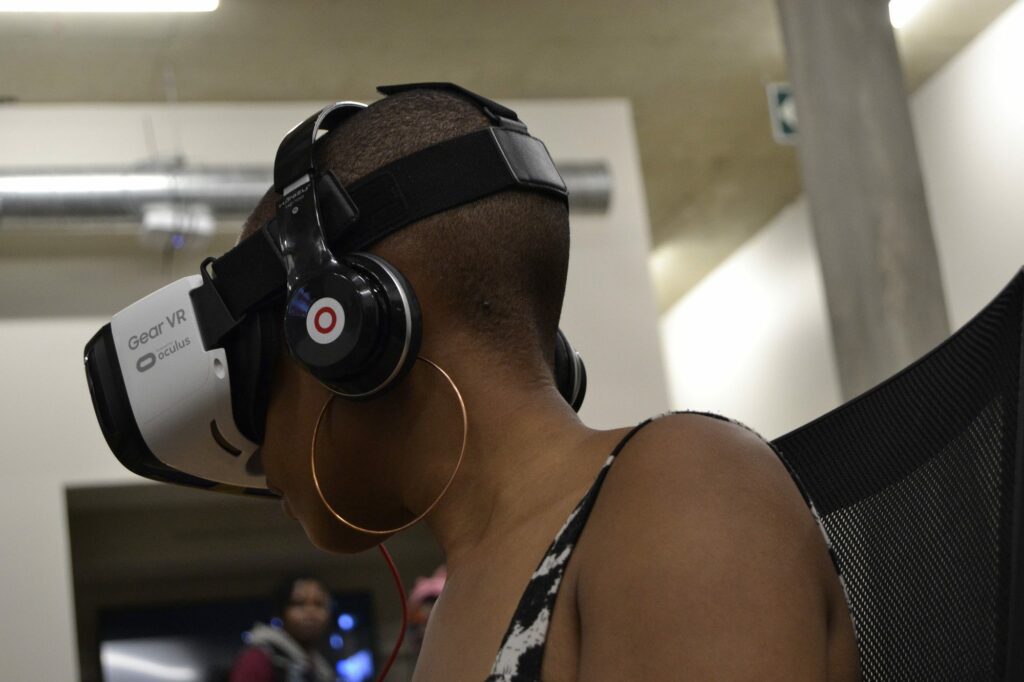Dakar , Johannesbrug, Karlsruhe
01 May 2018 - 31 Mar 2019

Fak’ugesi Festival, Digital Africa Residents Exhibition, 2017.
.
Afropixel workshops & residencies: February 15–May 12, 2018,
Afropixel festival in Dakar ‘Non-Aligned Utopias‘ : May 1–12, 2018,
Johannesburg Premonition:
Wits Art Museum exhibition : July 24–September 23, 2018,
Fak’ugesi festival: August 31–September 9, 2018,
ZKM | Karlsruhe exhibition ‘Situating Digital Imaginaries — Africas in Production’: November 17, 2018–March 31, 2019,
We speak of “digital imaginaries” to remind us that digital technologies are not self-evident or universal but configured in a historically contingent field. Articulating digital technologies and Africa together is an opportunity to reevaluate the dominant imaginaries that shape contemporary digital practices. That at least is our starting premise. To put it to the test, we invite artists and writers to Dakar, Johannesburg and Karlsruhe. The resulting works expose, disrupt, hack or subvert dominant digital imaginaries to propose alternative configurations of the digital.
Digital infrastructure projects increasingly link African sites directly with Chinese and Indian ones. Bypassing the networks of the Global North, they demonstrate that the violent colonial European origin myth of technology can no longer be sustained. What is less clear, is which possibilities this multiplication of centres opens for those concerned with alternative and non-Western configurations of digital practice? Large-scale Indian-African trials with digital medical care, biometric population registration or drone flight, or the sophisticated digital profiling and targeting of voters with manipulative videos during the 2015 Nigerian election hardly provide resources for imagining more desirable digital futures. According to Joseph Tonda, they are better understood as evidence of a screen-mediated postcolonial imperialism: evidence that Africa is subjected to “the same liberal techno-capitalist economic regime as the rest of the world.”
Dakar: Non-Aligned Utopias
If the ghosting of non-western technological histories and realities is impoverishing digital imaginaries, we should be able to recover resources for alternative configurations of the digital by paying attention to non-western digital practices, whether they emerge in Africa or elsewhere. Thus at least, is the utopian premise of digital non-alignment. A premise that energises experiments with alternative forms of digital production and local digital cultures. It is to this energy and the initiatives and experiments that nurture it that the first chapter of the Digital Imaginaries project in Dakar is dedicated. Léopold Sédar Senghor’s conviction, that cultural productions are central to the possibility of non-aligned Senegalese positionalities is lively here. So, is his proposition that African positionalities are important to the reconfiguration of richer universals. Afropixel #6, Digital Imaginaries: Non-Aligned Utopias revisits the old struggle for non-aligned African positionalities under the conditions of contemporary digital practices.
Ker Thiossane
Johannesburg: Premonition
In Johannesburg we engage with premonition. Premonition, as a mode of knowing the future, allows us to draw connections between non-western knowledges and globalised digital regimes. Large-scale climate models and the algorithms that influence credit ratings, insurance policies and social media feeds shift how uncertain futures are anticipated. This shift from modernist forecasting to artificial intelligence (AI) is a major rift in technological imaginaries as it blurs the division between mathematical and other forms of prediction. In Johannesburg the tension between great potential and anxiety is palpable. It is manifest in the tension between urban confidence and pervasive security. The screen-mediated cosmopolitanism of the city is abuzz with nervous energy. It is with this digitally mediated ambivalent sentiment of premonition that we invite artists and writers to address their encounters with this elusive metropolis, both as location for sub-altern knowledges and via its public.
WAM / Fak’ugesi
Karlsruhe: Situating Digital Imaginaries – Africas in Production
East, West, South and North do not refer to parts of the globe but to imaginaries that are in global circulation. The third chapter of Digital Imaginaries in Karlsruhe takes seriously that African positionalities contribute to universals that are legible around the world. Situating the works that emerged in response to Dakar and Johannesburg in Karlsruhe, is to show that they matter in a German town. Not as evidence of otherness, but because here too the questions they raise about possible alternative configurations of the digital are relevant.
Funders
Digital Imaginaries is a joined project of Kër Thiossane and Afropixel Festival in Dakar, Wits Art Museum and Fak’ugesi African Digital Innovation Festival in Johannesburg, and ZKM | Center for Art and Media Karlsruhe, funded by the TURN Fund of the German Federal Cultural Foundation (Kulturstiftung des Bundes). The workshop series Competences and Visions for the Digitization of Africa in Dakar and Johannesburg is financed by the GIZ commissioned by the German Federal Ministry for Economic Cooperation and Development.
Project Team
Scientific adviser and project initiator: Richard Rottenburg
Project curators: Julien McHardy, Oulimata Gueye
Afropixel artistic director: Marion Louisgrand Sylla
Curators Afropixel: Oulimata Gaye, Daniel Sciboz, Julien McHardy
Afropixel producers: Marion Aïdara, Martha Cissé, Amayel Ndiaye
Fak’ugesi artistic director: Tegan Bristow
Curators Wits Art Museum: Fiona Rankin-Smith, Tegan Bristow, Julien McHardy
Curators ZKM: Philipp Ziegler, Oulimata Gueye, Julien McHardy
Participating artists: Younes Baba Ali, Tegan Bristow, Marcus Neustetter, François Knoetze, Tabita Rezaire, Kombo Chapfka, DK Osseo-Asare, Yasmine Abbas, et al.
Kër Thiossane
Sicap Liberté II Villa N°1695
Ville CP: 10664, Dakar
Senegal
Wits Art Museum
University Corner, Jorissen St & Bertha St
Johannesburg 2050
South Africa
ZKM | Center for Art and Media Karlsruhe
Lorenzstraße 19
76135 Karlsruhe
Germany